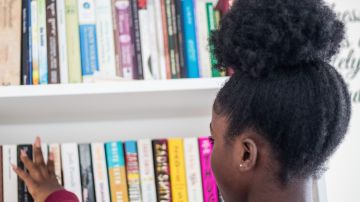15 Woke Books People Will Actually Want As Gifts
When you get a loved one a gift, you want it to bring joy and a sense of fulfillment

Photo: Unsplash/@skmuse_
When you get a loved one a gift, you want it to bring joy and a sense of fulfillment. In other words, you want them to actually like it! An added bonus if it also educates, right? The truth is, nothing opens up someone to another world or new facets of an existing one quite like books. The holidays are officially here so in case you weren’t sure what to get your friends and fam, here are 15 great books that will keep them woke, informed, and empowered. Check them out and thank us later!
wp_*posts
The Fire Next Time by James Baldwin
Novelist, essayist, and social critic James Baldwin explored race, sexuality, and differences in class in his work. His book, The Fire Next Time, is made up of two letters, that take on religion and the issue of racial injustice.
wp_*posts
Open Veins of Latin America by Eduardo Galeano
Open Veins of Latin America: Five Centuries of the Pillage of a Continent looks at the different things that the Europeans colonizers took from Latin American countries and the aftereffects. It is one of the books John Leguizamo recommends as essential reading for all Latinos.
wp_*posts
Bird of Paradise: How I Became Latina by Raquel Cepeda
Raquel Cepeda’s Bird of Paradise: How I Became Latina is her personal journey to discovering who she is. Ancestral DNA testing was the key that helped Cepeda unlock the identity of a Dominicana in New York.
wp_*posts
You Are a Badass by Jen Sincero
We are all for books that help you remember your awesomeness. Jen Sincero’s You Are a Badass: How to Stop Doubting Your Greatness and Start Living an Awesome Life is just the book to remind someone special in your life that they can kick ass in life.
wp_*posts
Guns, Germs, and Steel by Jared Diamond
https://www.instagram.com/p/BgVtUnYjxx0/
Pulitzer Prize-winning Gun, Germs, and Steel: The Fates of Human Societies is a book that offers explanations for why some cultures have been more successful than others. It allows readers to see how certain factors have led to the inequality we see today.
wp_*posts
When I Was Puerto Rican: A Memoir by Esmeralda Santiago
When I Was Puerto Rican is Esmeralda Santiago’s autobiography. It talks about her transition from an upbringing in Puerto Rico to a new existence in New York, and how it felt to live between two cultures.
wp_*posts
A People’s History of the United States by Howard Zinn
https://www.instagram.com/p/BqssrSIHMve/
As adults, we often feel the need to relearn the history that we were incorrectly taught in grade school. A People’s History of the United States gives the power of telling the story back to the people—the Native Americans, African-Americans, laborers, the poor, and more.
wp_*posts
1491: New Revelations of the Americas Before Columbus, Charles C. Mann
Another book on John Leguizamo’s list of books that Latinos should read (you can check out the list here and here) is 1491: New Revelations of the Americas Before Columbus. It tells the truth about the indigenous cultures that thrived before Columbus arrived—the truth we weren’t taught.
wp_*posts
Girl, Wash Your Face: Stop Believing the Lies About Who You Are so You Can Become Who You Were Meant to Be by Rachel Hollis
https://www.instagram.com/p/Bq26_yzh-16/
Another great book to inject some positivity and empowerment into your life is Girl, Wash Your Face: Stop Believing the Lies About Who You Are so You Can Become Who You Were Meant to Be. Rachel Hollis breaks down various lies we tell ourselves and how to change from that mindset.
wp_*posts
An Indigenous Peoples’ History of the United States by Roxanne Dunbar-Ortiz
We should be learning about indigenous history in school because it is the part of the history of America. However, it is glossed over in favor of European-American narratives. Books like Roxanne Dunbar-Ortiz’s An Indigenous Peoples’ History of the United States aims to put the focus of the narrative back on the American Indians, so we can finally learn the truth.
wp_*posts
Life and Death in the Andes by Kim MacQuarrie
Life and Death in the Andes: On the Trail of Bandits, Heroes, and Revolutionaries takes us on a trip to South America, and lets us relive its history. It is said to be an informative book you won’t want to put down.
wp_*posts
The New Jim Crow by Michelle Alexander
The only way we can change what’s wrong with America (and the world) is to first be informed about what is really happening. Michelle Alexander’s book, The New Jim Crow: Mass Incarceration in the Age of Colorblindness takes a look at how the justice system has been designed to control and keep down African-Americans.
wp_*posts
How to Travel without Seeing by Andres Neuman
How to Travel without Seeing: Dispatches from a New Latin America is a trip with author Andres Neuman to 19 Latino countries. He shares with readers interesting observations from each nation, observations that perhaps other writers would have missed.
wp_*posts
American Like Me by America Ferrera
Actress and activist America Ferrera decided to share her experience living as both an American and a Honduran in her book, American Like Me: Reflections of Life Between Cultures. She also asked her fellow celeb friends to do the same, compiling personal stories from Uzo Aduba, Kal Penn, Anjelah Johnson, and more.
wp_*posts
Growing Up Chicana/o: An Anthology by Tiffany Ana Lopez
https://www.instagram.com/p/BejEtLSFkdD/
Growing Up Chicana/o is a book that will give readers a window into the Chicano experience. The anthology features 20 stories by Mexican-Americans.

















